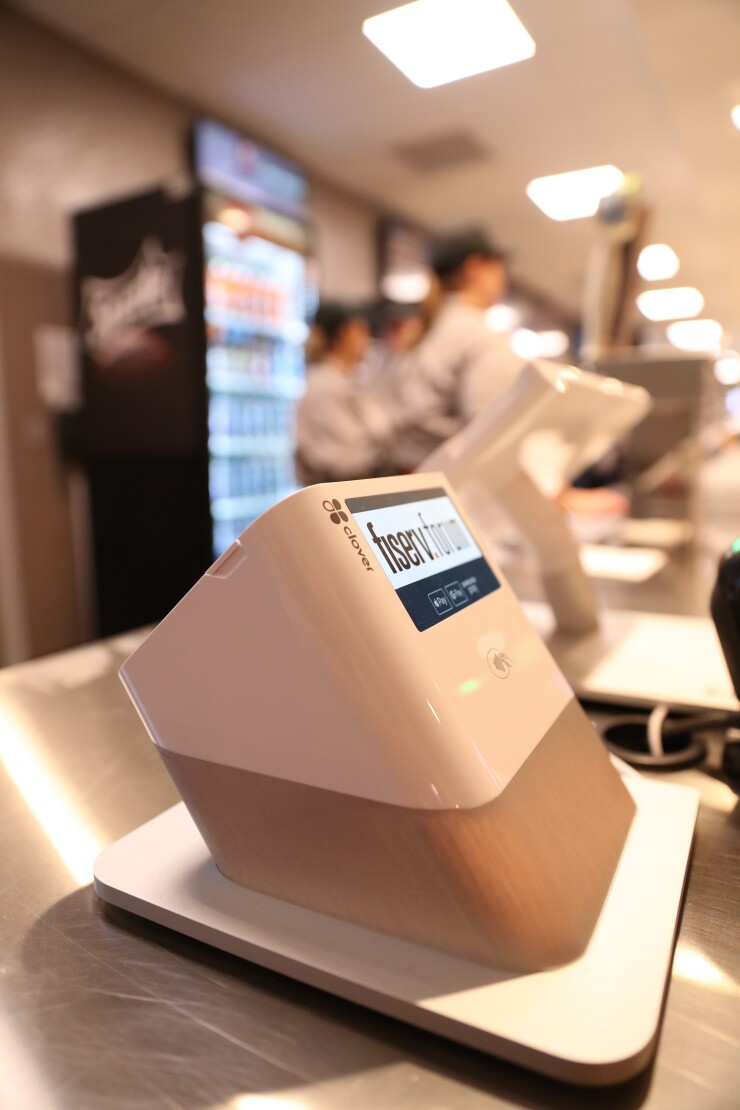The mobile point of sale platform Clover was a star in First Data’s attempts to diversify beyond payment processing. First Data's new owner, Fiserv, sees a similar role for Clover — with sports becoming a prime venue.
For the 2019-20 NBA season, Fiserv deployed several Clover products at the Milwaukee Bucks’ two-year-old arena. Fiserv has the naming rights for the arena, called the Fiserv Forum, creating heightened stakes as the arena's concession ordering and payments overhaul takes place just as Fiserv integrates its
The arena has added several types of terminals, such as Clover Station, Clover Mini and Clover Flex. Arena personnel select the model based on the nature of the transaction.

The Clover Mini, for example, can face the customer or the merchant, enabling consumers to use it to place orders; while another product, the Clover Flex, can be used by staff to walk through the stands and receive orders and payments away from the concession stand.
Fiserv hopes to enable new concession models, such as mobile order and pickup at a predetermined location. A successful Fiserv Forum deployment will drive the bank technology company's wish to bring Clover to new merchant types, continuing the
Competitors abound. One impetus for the large payment processor mergers in 2019 was the growth of technology-driven merchant acquirers such as
“Merchants have complex needs in an increasingly complex market,” said Mark Schulze, Clover’s co-founder and a vice president at Fiserv, adding Clover’s yearly volume is already expanding at about 40%. “It’s important to have a platform that’s easy to use to make partnerships.”
In the early stages — the NBA season is still less than two months old — the Bucks deployment has allowed concession staff to manage an average of six transactions per second, an improvement over the prior four-per-second average, Schulze said. It also provides a window into how enhancements to the Clover line of products work in a high-stress environment, a lesson Schulze hopes will be applied in other retail categories.
“What you learn at stadiums is how to handle and work with a high volume, a high transaction rate, and work with staff that have high turnover and require lots of training,” Schulze said. “We want to have Clover be simple to use so it doesn’t require a [learning curve], and can be quickly deployed at any high volume venue, such as a restaurant in a central city.”
Sporting events have long served as testing grounds and showcases for new payment technology, creating both a model for Fiserv to test new deployments for Clover and a source of competition.
Sports are a staple at Visa, which tested cashless payments at the
In the checkout-free technology market, a potential competitive market for point of sale hardware sellers, Amazon Go's rivals are also pushing sports payments to demonstrate the technology can work outside of small grocery stores.
Clover has made several other deployments at sports facilities, such as
“Arenas have several unique features that make them a good place to test technology. First they are used for finite events, so the offering isn’t implemented into a ‘run-time’ environment,” said Thad Peterson, a senior analyst at Aite. “If any problems are encountered, they can be identified during the event and addressed quickly after the event is over, eliminating the challenge of remediation in a live environment.”
The telecommunications companies and sports teams have invested heavily in broadband technology and apps in arenas to showcase their capabilities and to enhance the customer experience for fans, Peterson said. “With massive bandwidth and cutting edge apps, a payments provider can test their offering at the front end of the technology curve.”





